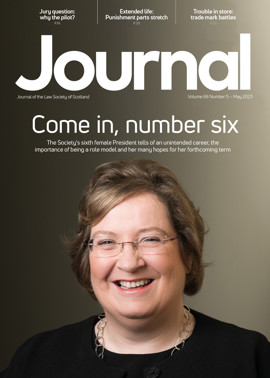No cause for celebration – yet

The coming into force of the Legal Aid and Advice and Assistance (Miscellaneous Amendment) (Scotland) (No 2) Regulations 2023 (SSI 2023/135) on 29 April represents the biggest ever fee change in state funded legal assistance in Scotland.
Increases in advice and assistance and civil legal aid rates, as well as a further move of solemn criminal to block charges – with associated increases – are designed both to increase the investment made by the Scottish Government and to simplify further the procedures for claiming fees in the most serious criminal cases. We are assured that this will be to the benefit of the profession.
Access to justice is a cornerstone of any civilised society which values the rule of law. Central to that is a commitment to state funding for those who cannot themselves afford to pay for legal help. It is truly remarkable that there remains a cohort of Scottish solicitors willing to provide legal aid despite the system having sustained a generation of underfunding. The efforts of the Law Society of Scotland, its office bearers, senior leadership team and the conveners and volunteer members of its Legal Aid Committee – supported by the executive and members of the Scottish Solicitors’ Bar Association – have been unstinting in trying to deliver the message to Government that a crisis point has been reached.
Number crunching
In early July 2022 the Government rejected the call for specific fee increases that it costed at £25 million as unaffordable. Having put its hands down the back of the proverbial sofa, the maximum increase was identified as £11 million. With firms and practitioners turning away from legal aid at an accelerating rate, and few new solicitors indicating attraction to that area of work, the Government was asked to implement fee increases that would deliver an additional investment. Nine months later, regulations have taken effect. Broadly, advice and assistance and civil legal aid rates increase by 10%. The core criminal fixed fees in summary increase by 4%; other changes reverse cuts imposed on the basis of austerity years ago.
As for solemn fees, the Government has restructured the system, increasingly using blocks to average out remuneration and work. With the introduction of a more favourable fee for cases that are resolved “early”, the perverse incentive to run a case to trial where a plea of guilty would be appropriate is removed. The detail of the revised solemn fee structure, previously rejected, was not the subject of discussion or negotiation. Ultimately, we are left to trust the number crunchers at SLAB that changes will be to the profession’s benefit.
Society engagement
The Society is in a unique position when it comes to discussions with Government over legal aid – some may say unenviably so. The Society is not a trade union. As a regulator of the profession whose members are officers of court and owe duties consistent with obligations higher than to themselves, its place may be seen as a friend to Government, providing sage advice on important matters. It has not always been clear that such advice was heeded. It has been clear that it was not always welcome.
The Society has been careful in the words it has used to acknowledge the fee changes. The increases were not at the level we had sought, nor were they targeted as we suggested. But fees are being increased and restructured. We have been assured that the year-on-year investment will increase by £11 million. In the context of a profession that has been prepared to work tomorrow – and the day after tomorrow – for the fee paid yesterday (and many years ago), an increase is good. Am I wrong? Maybe at these levels not something to celebrate, but certainly something to acknowledge.
As the Society continues to engage with a Government looking to develop a system for regular fee reviews, the profession should be reassured that its aim of ensuring solicitors are properly remunerated for the valuable work they do, and thereby protecting access to justice, remains enthusiastically and realistically pursued.
Messy process
And with a restructured Government, setting out its stall to the people of Scotland, we have seen a commitment to provide justice organisations with the resources needed to clear the Covid backlogs. Many justice partners, not least the Lord President, have repeatedly acknowledged the need to ensure a balance in funding between Crown and defence. The new First Minister was previously persuaded of the need to provide extra support to legal aid solicitors in the Covid context. It would be good to see him endorse a similarly informed and empathetic approach now. If not, the sums so far committed may be to little effect.
It is said that the making of laws, like sausages, is a process that should not be exposed to public gaze. In my experience legal aid discussions are just as messy. I have every confidence that those who are taking these matters forward, in both the Society and the SSBA, are not diminished in their enthusiasm to make a difference, both for their fellow solicitors and for the clients they represent.
Perspectives
Features
Briefings
- Civil court: Spotlight on the Sheriff Appeal Court
- Employment: Must do better – the s 23 approach
- Human rights: Crime, detention and mental health issues
- Pensions: A question of tax
- Scottish Solicitors' Discipline Tribunal: May 2023
- Family: The slide rule of grave risk
- In-house: A route to diversity







